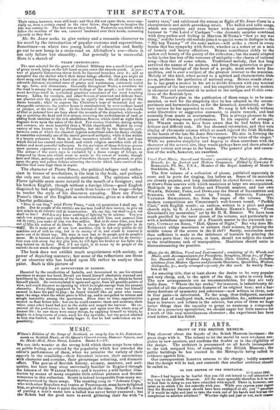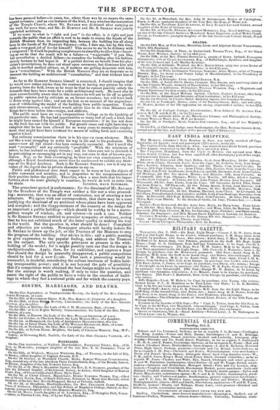FINE ARTS.
FRONT OF THE BRITISH MUSEUM.
THE clamour about the façade of the Britsh Museum increases: the press rings with it. The refusal to let the model be seen awakens suspicion in new quarters, and confirms the doubts as to the eligibility of the design. The architect is pronounced on all hands incompetent to the task assigned him, of completing the British Museum ; the public buildings he has erected in the Metropolis being called in evidence against him. Our correspondent IGNOTUS returns to the charge ; boldly assumes that the design will be bad, and contends that another architect should be called in.
TO VIE EDITOR OF THE SPECTATOR. 3d OztoLer 1893.
SIR—I had begun to he fearful that you did not intend to call attention in any way to the British Museum. All the more agreeable therefore is it to me to find that in doing so you have coincided with myself. There is, however, one point as to which I do not coincide with you. While you express your regret that Sir ROBERT Suntan should have been employed at all, you a question if it would be right and just to take the work out of his hands and intrust the completion to another architect." Whether right and just or not, such coarse has been pursued before-in cases, too, where there was by BO means the same urgent necessity: and as one instance of the kind, I may mention the restoration of the Temple Church, where Mr. SAVAGE was dismissed after carrying on the work for some time, and Mr. D. BURTON and Mr. S. SIMILE were jointly appointed architects. -If we come to what is "right and just" in the affair, is it right and just towards the public that no effort is now to be made to rescue the facade of the British Museum from its impending fate, because the building has all along been in the hands of Sir ROBERT &GHEE-who, I dare say, has by this time, made a very good job of it-for himself? This seems to me to be delicacy with a vengeance ! It would be pushing complaisance to absurdity to allow him-knowing as we do that the result will be a failure-a "respectable" if you like, but nevertheless a decided failure-to complete the building after his fashion, merely because be had begun it. If a patient derives no benefit from his physician's prescriptions, he does not stand upon ceremony, but dismisses him and calls in another medical adviser, or, if matters are getting desperate with him, has a "consultation." With the British Museum they are so desperate as to warrant the holding an architectural "consultation," and that without loss of time.
As far as Sir ROBERT SMILER himself is concerned, I should imagine that be would now rather rejoice than the contrary at having any pretext for withdrawing from the field, aware as he must be that he cannot possibly satisfy the demands that have been made for a noble architectural work. He must also be most uncomfortably aware that in this instance he will not be let off so quietly by public opinion and by criticism as on former occasions, but will have both in fierce array against him; and not the less so on account of the ungraciousness of withholding the model of the building from public inspection. Under such circumstances, a real friend would advise him to do what Ministers and Kings bare done before him-resign, and abdicate.
The public need have no very compunctious feelings as to the hardship of his particular case. He has had opportunities so many and of such a kind, that he might have earned for himself a European reputation : if he has not done so, the fault lies not with the public. Far greater cause and right have they to complain that he has been allowed for so many years to monopolize employment that might have been rendered the means of calling forth and exercising superior talent.
For ordinary commiseration there is in his case co room whatever. He is not like a man struggling to make his way in life and in his profession. His career-now all hut closed-has been eminently successful. But I recall the word "successful,' and say eminently "prqfitable." With the minimum of talent, he has realized an ample fortune ; and he takes care not to diminish it by patronizing or encouraging art in any way, not even in that of his own profession. Nay, so far from encouraging, he does not even countenance it ; for although a Royal Academician, never does he condescend to exhibit any drawings at the Royal Academy. Such is Sir ROBERT &GRIM; nor is it any invasion of the regard due to private character to say so. Public and professional men must expect to be more or less the objects of public comment and scrutiny, and in proportion to the conspicuousness of their position before the public. Therefore, when a man finds that his imperfections show the more glaringly in sunshine, he would do well to retire into the shade. IGNOTUS, BAUD IGNORANS.
The precedent quoted is unfortunate; for the dismissal of Mr. SAVAGE by the Benchers of the Temple was neither a fair nor a wise proceeding: moreover, that was an affair of restoration, not of erecting a new structure. We agree with our correspondent, that there may be a case justifying the dismissal of an architect whose plans have been approved and accepted ; and the disappointment of the country at the design for so important a public building-which should be worthy to be a metropolitan temple of wisdom, art, and science-is such a one. Neither is Sir ROBERT SmraxE entitled to peculiar sympathy or delicacy, seeing that he has not exhibited much of the latter quality in making his way in the world. But the question is, what should be done ? Complaint and objection are useless. Newspaper attacks will hardly induce Sir R. SMIRKE to throw up the job, or the Trustees of the Museum to stop the progress of the buildiog. Our advice is this : call a public meeting to give expression to the popular feeling, and address the Trustees on the subject. The only specific grievance at present is the withholding of the model ; for it might possiLly turn out that the design is unobjectionable. Apply, then, for its exhibition, and express a hope that should the design be generally disapproved, a public competition should be had for a new façade. That such a proceeding would be successful, is doubtful, considering the callous inertness of bodies holding irresponsible power ; and it Is not beyond the pale of possibility that if a competition were obtained the best design might not be selected. But the attempt is worth making, if only to raise the question, and assert the right of the public to have a voice in the erection of buildings in which they feel a national pride and for which the country pays.



























 Previous page
Previous page